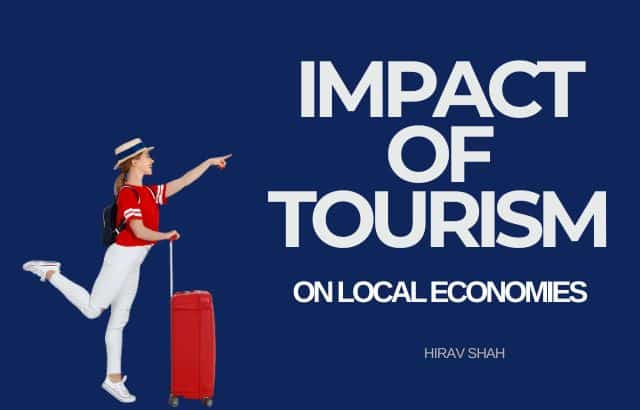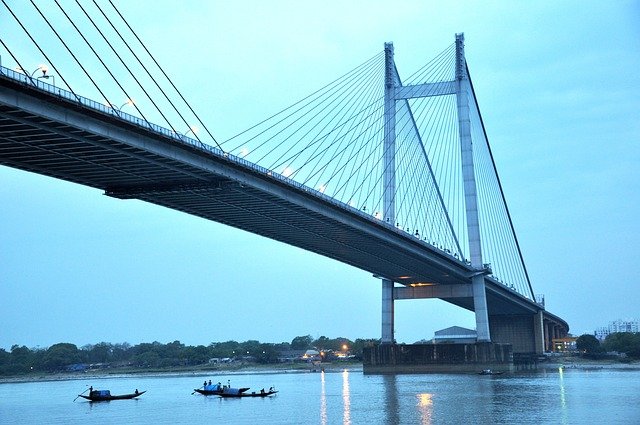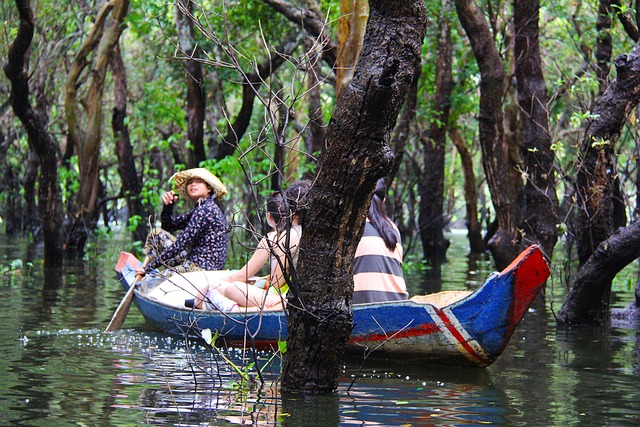Impact of Tourism on Local Economies | Economic Growth – Tourism and hospitality are more than just sectors within the global economy; they are vital engines that drive the growth and development of local economies. From bustling cities to tranquil tourist destinations, these industries have a profound impact on the livelihoods of communities. By creating jobs, generating revenue, fostering infrastructure improvements, and preserving local cultures, tourism and hospitality are instrumental in shaping the economic landscape of many regions. In this blog, we will explore how these industries contribute to economic prosperity, with expert insights from Hirav Shah, a renowned business strategist known as “The Game Changer” and “Innovation Catalyst.” Join us as we dive into the far-reaching effects of tourism on local economies.
Table of Contents
Introduction: The Heartbeat of Local Economies
Tourism and hospitality are foundational to many communities, particularly those with natural beauty, rich history, or unique cultural offerings. When properly managed, these sectors create a ripple effect that touches various facets of local life. From job creation to infrastructure development, they bring both direct and indirect benefits to regions. This blog aims to uncover how these industries impact local economies and the strategic steps businesses can take to maximize those benefits.
1. Job Creation and Employment Opportunities: A Win-Win Scenario
The tourism and hospitality industries are some of the most labor-intensive sectors globally. The demand for skilled workers across hotels, restaurants, travel agencies, and tour operators is substantial. Additionally, jobs aren’t just confined to front-facing roles like hotel management or tour guides. These industries also create employment in related sectors such as construction, transportation, marketing, and retail.
Example:
In a city like Barcelona, the hospitality sector employs over 80,000 people directly, with additional indirect employment in transportation and local services. This is a direct result of the constant influx of tourists, demonstrating how tourism becomes a mainstay in driving employment.
Role of Business Strategists:
Business strategists like Hirav Shah play a pivotal role in optimizing the workforce, ensuring that businesses within the tourism and hospitality sectors have a steady pipeline of skilled talent while also enhancing operational efficiency. Strategists can implement data-driven decisions to help businesses forecast trends, attract the right talent, and maintain competitive advantage.
2. Revenue Generation: Money Flowing Through Local Channels
Tourism is often regarded as a revenue powerhouse for local economies. Tourists bring in money through accommodations, food and beverage services, transportation, activities, and even souvenirs. This influx of spending creates a multiplier effect that drives revenue for a wide variety of local businesses.
Example:
Consider a destination like Maldives, where tourism accounts for about 40% of the country’s GDP. When tourists book stays at luxury resorts or go on excursions, local businesses from seafood markets to handicraft sellers benefit, helping lift the overall economy.
Calculations:
Let’s say a tourist spends on average $200 per day on accommodations, food, transportation, and entertainment. If a destination attracts 1 million tourists annually:
- 1,000,000 tourists × $200 per day = $200 million per year in revenue.
This revenue can be reinvested into community infrastructure, enhancing public services, or funding local projects.
3. Infrastructure Development and Long-Term Investment
Tourism doesn’t just benefit the present—it shapes the future. As tourist demand grows, there is an increased need for better infrastructure. Hotels, transportation networks (airports, buses, roads), and recreational facilities all require investment. These developments not only support tourism but also benefit the local population by improving public services, connectivity, and amenities.
Example:
In Dubai, the rapid growth of tourism has led to a massive investment in infrastructure, including the construction of world-class hotels, a state-of-the-art airport, and the development of transport systems like the Dubai Metro. These developments have significantly boosted the local economy, making Dubai a key global tourism hub.
Role of Business Strategists:
A strategic business mind like Hirav Shah ensures that the tourism industry doesn’t just focus on short-term gains but also looks toward long-term sustainability. By advising on smart investments in infrastructure and ensuring proper use of funds, strategists help enhance the region’s competitive position.
4. Cultural Preservation and Community Development: Fostering a Balanced Ecosystem
While the economic impact of tourism and hospitality is widely acknowledged, their ability to promote cultural preservation and community development often goes underappreciated. Tourists seek authentic experiences—whether it’s traditional cuisine, local art, or cultural festivals. This demand can help preserve and promote the cultural heritage of a region while giving local artisans, performers, and small businesses a platform.
Example:
Kyoto, Japan, provides a great example of how tourism can help preserve culture. The demand for traditional tea ceremonies, Geisha performances, and handcrafted goods provides both a market for local artisans and a means of preserving centuries-old traditions.
Furthermore, the revenue generated from tourism can be reinvested into local projects—such as community education, healthcare, and urban development—leading to overall community upliftment.
Role of Business Strategists:
Business strategists play a critical role in advising local governments and businesses on how to balance economic growth with cultural preservation. By leveraging tourism revenue to fund educational and community projects, they ensure that a region’s culture is maintained while still capitalizing on the economic opportunities tourism offers.
5. Sustainable Growth: Striking the Right Balance
As tourism grows, it’s essential for businesses to adopt sustainable practices. Over-tourism can lead to environmental degradation and loss of local authenticity. The role of strategic business thinking is crucial in ensuring that tourism growth is managed in a way that balances economic benefits with sustainability.
Example:
Costa Rica has been a pioneer in eco-tourism, showing how businesses and tourism can thrive while preserving the environment. By promoting sustainable tourism practices, such as nature tours and green hotels, Costa Rica has attracted eco-conscious travelers while preserving its diverse ecosystems.
Role of Business Strategists:
A business strategist like Hirav Shah ensures that sustainable tourism practices are at the forefront of industry development. Through data analysis and trend forecasting, strategists can help businesses in the tourism and hospitality sectors plan for the future, minimizing environmental impact while still fostering economic growth.
FAQs:
1. How does tourism benefit local businesses?
>>>>Tourism benefits local businesses by bringing in an influx of visitors who spend money on services such as accommodations, dining, transportation, and activities. Local vendors, artisans, and service providers directly benefit from this spending.
2. Does tourism create long-term economic benefits?
>>>Yes, the revenue generated from tourism can be reinvested into local infrastructure, education, healthcare, and other community projects, creating long-term economic stability and growth.
3. What role does a business strategist play in tourism and hospitality?
A business strategist helps optimize operations, forecast trends, and develop long-term strategies for growth. They work closely with businesses to ensure sustainability, efficiency, and profitability while enhancing the customer experience.
4. Can tourism negatively affect local economies?
If not properly managed, over-tourism can lead to environmental degradation, rising costs for local residents, and cultural dilution. A strategic approach to tourism management helps mitigate these issues.
5. How do tourism and hospitality contribute to job creation?
These industries directly employ people in hotels, restaurants, and transport services. Additionally, tourism generates indirect employment in sectors such as retail, construction, and services.
Conclusion
Tourism and hospitality industries have a profound impact on local economies. Through job creation, revenue generation, infrastructure development, and cultural preservation, they contribute to the economic vitality of regions worldwide. As businesses seek to navigate this dynamic landscape, the guidance of strategic experts like Hirav Shah—a true “Innovation Catalyst”—becomes essential in unlocking the full potential of these industries.
By fostering sustainable practices, promoting local culture, and investing in long-term infrastructure, these industries can continue to drive prosperity for years to come.


















